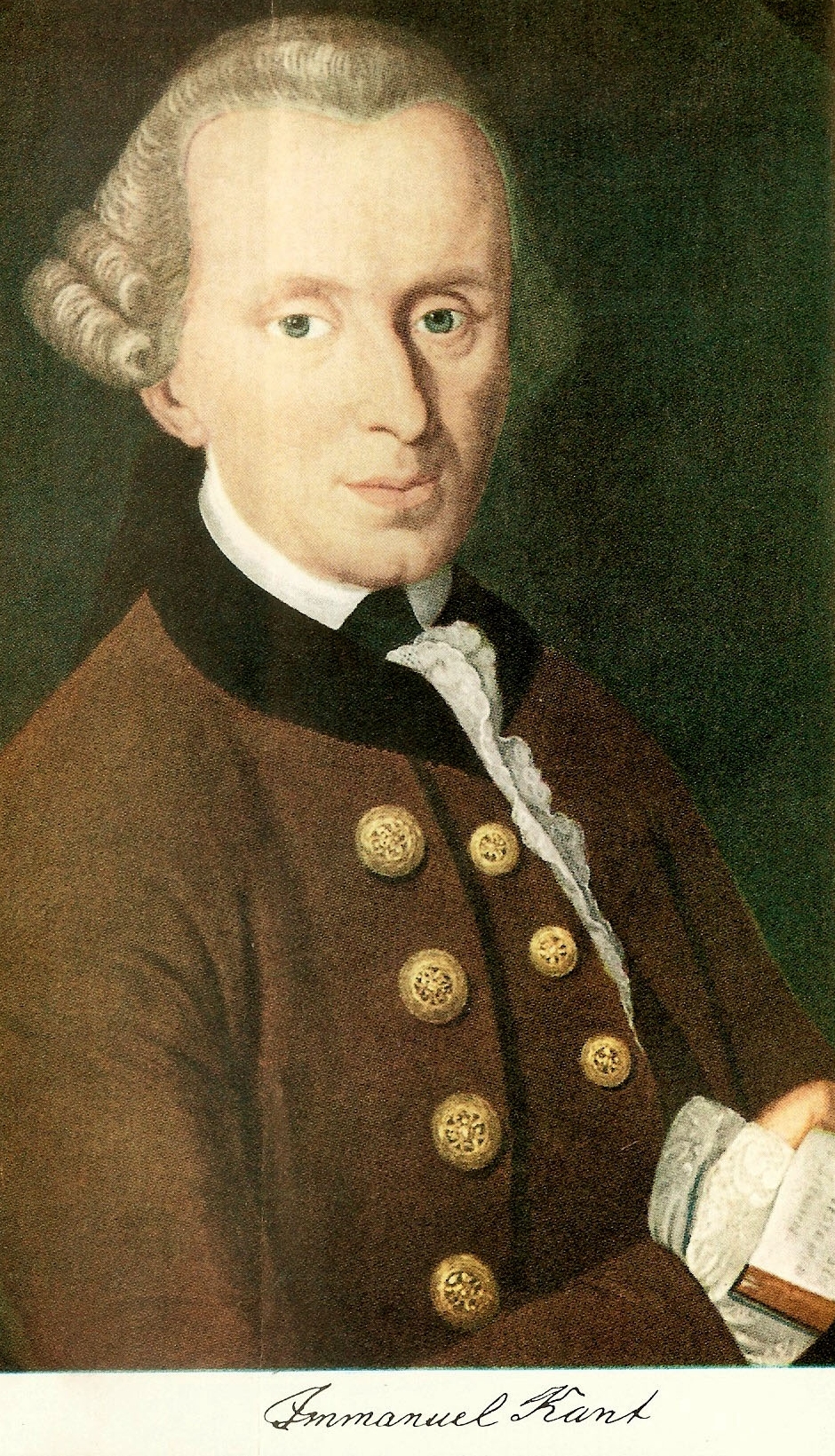Immanuel Kant najznámejšie citáty

„Muž je žiarlivý, keď miluje; žena i keď nemiluje.“
Potvrdené výroky
Zdroj: [KOTRMANOVÁ, Milada.: Perly ducha. Ostrava: Knižní expres, 1996 ISBN 80-902272-1-X]
Immanuel Kant Citáty o živote
„Najmenej sa boja smrti tí, ktorých život má najväčšiu cenu.“
Potvrdené výroky
Zdroj: [KOTRMANOVÁ, Milada.: Perly ducha. Ostrava: Knižní expres, 1996 ISBN 80-902272-1-X]
Immanuel Kant citáty a výroky
Varianta: Človeku, ktorý si zlomil nohu, môžeme v jeho nešťastí pomôcť tým, že ho presvedčíme, ako ľahko si mohol zlomiť väz.

„Prvou starosťou človeka by nemalo byť šťastie, ale to, aby bol toho šťastia hodný.“
Potvrdené výroky
Zdroj: Porovnaj: Bulletin Jezuité 5/2006
„Milovať blížneho znamená rád plniť každú povinnosť, ktorú voči nemu mám.“
Potvrdené výroky
Zdroj: [151]
Immanuel Kant: Citáty v angličtine
“Natural science is throughout either a pure or an applied doctrine of motion.”
Preface, Tr. Bax (1883)
(1786)
“Do what is right, though the world may perish.”
This is quoted as Kant in Building Academic Language: Essential Practices for Content Classrooms, Grades 5-12 (2007) by Jeff Zwiers, p. 202, but apparently derives from Kant's arguments in support of the far older Latin proverb Fiat iustitia, pereat mundus — "Do what is right though the world should perish." which was the subject of an essay: "Kant on the Maxim 'Do What Is Right Though the World Should Perish'" by Sissela Bok, in Argumentation 2 (February 1988). There was also a similar latin proverb Fiat iustitia ruat caelum — Let justice be done though the heavens fall.
Misattributed
Groundwork of the Metaphysics of Morals (1785)
“Human reason is by nature architectonic.”
B 502
Critique of Pure Reason (1781; 1787)
Der kategorische Imperativ, der überhaupt nur aussagt, was Verbindlichkeit sei, ist: handle nach einer Maxime, welche zugleich als ein allgemeines Gesetz gelten kann.
Zdroj: Metaphysics of Morals (1797), Ch. 11
Third Thesis
Idea for a Universal History from a Cosmopolitan Point of View (1784)
A 747, B 775; as translated by F. Max Mueller
Critique of Pure Reason (1781; 1787)
On a Supposed Right to Tell Lies from Benevolent Motives (1797)
As quoted in German Thought, From The Seven Years' War To Goethe's Death : Six Lectures (1880) by Karl Hillebrand, p. 208
Kontext: As everybody likes to be honoured, so people imagine that God also wants to be honoured. They forget that the fulfilment of duty towards men is the only honour adequate to him. Thus is formed the conception of a religion of worship, instead of a merely moral religion. … Apart from moral conduct, all that man thinks himself able to do in order to become acceptable to God is mere superstition and religious folly. If once a man has come to the idea of a service which is not purely moral, but is supposed to be agreeable to God himself, or capable of propitiating him, there is little difference between the several ways of serving him. For all these ways are of equal value. … Whether the devotee accomplishes his statutory walk to the church, or whether he undertakes a pilgrimage to the sanctuaries of Loretto and Palestine, whether he repeats his prayer-formulas with his lips, or like the Tibetan, uses a prayer-wheel … is quite indifferent. As the illusion of thinking that a man can justify himself before God in any way by acts of worship is religious superstition, so the illusion that he can obtain this justification by the so-called intercourse with God is religious mysticism (Schwärmerei). Such superstition leads inevitably to sacerdotalism (Pfaffenthum) which will always be found where the essence is sought not in principles of morality, but in statutory commandments, rules of faith and observances.
What is Enlightenment? (1784)
Book IV, Part 1, Section 1, “The Christian religion as a natural religion”
Religion within the Limits of Reason Alone (1793)
Seventh Thesis
Idea for a Universal History from a Cosmopolitan Point of View (1784)
Eighth Thesis
Idea for a Universal History from a Cosmopolitan Point of View (1784)
Perpetual Peace: A Philosophical Sketch (1795)
Von einem tungusischen Schaman, bis zu dem Kirche und Staat zugleich regierenden europäischen Prälaten … ist zwar ein mächtiger Abstand in der Manier, aber nicht im Prinzip, zu glauben; denn was dieses betrifft, so gehören sie insgesammt zu einer und derselben Klasse, derer nämlich, die in dem, was an sich keinen bessern Menschen ausmacht (im Glauben gewisser statutarischer Sätze, oder Begehen gewisser willkürlicher Observanzen), ihren Gottesdienst setzen. Diejenigen allein, die ihn lediglich in der Gesinnung eines guten Lebenswandels zu finden gemeint sind, unterscheiden sich von jenen durch den Ueberschritt zu einem ganz andern und über das erste weit erhabenen Prinzip.
Book IV, Part 2, Section 3
Religion within the Limits of Reason Alone (1793)
Kt6:333
Metaphysics of Morals (1797)
Part III : Selection on Education from Kant's other Writings, Ch. I Pedagogical Fragments, # 53
The Educational Theory of Immanuel Kant (1904)
Book IV, Part 1, Section 1, “The Christian religion as a learned religion”
Religion within the Limits of Reason Alone (1793)
“Thus our duties to animals are indirectly duties to humanity.”
Part II, p. 213
Lectures on Ethics (1924)
Preface to the Second Edition [Tr. F. Max Müller], (New York, 1900), p. 690; as cited in: Robert Edouard Moritz, Memorabilia mathematica or, The philomath's quotation-book https://openlibrary.org/books/OL14022383M/Memorabilia_mathematica, Published 1914. p. 10
Critique of Pure Reason (1781; 1787)
Part III : Selection on Education from Kant's other Writings, Ch. I Pedagogical Fragments, # 60
The Educational Theory of Immanuel Kant (1904)
“Is it reasonable to assume a purposiveness in all the parts of nature and to deny it to the whole?”
Seventh Thesis
Idea for a Universal History from a Cosmopolitan Point of View (1784)
Second Thesis
Idea for a Universal History from a Cosmopolitan Point of View (1784)
